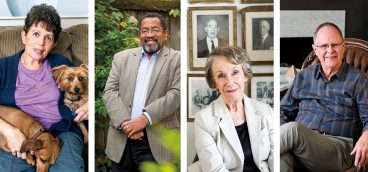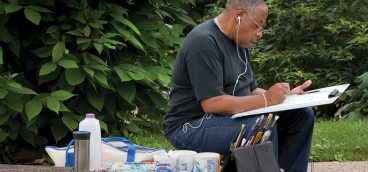The Retirement Question, Part III

This is the final installment in a three-part series about retirement in our region.
Mark D. Bondi
President & CEO
Sherwood Oaks Retirement Community
What kind of future do you want? Experts tell us that there are several components to feeling well, including the emotional, spiritual, cognitive, social, physical and vocational aspects of life. As we look forward to a future in retirement, it may be a good time to look at strengthening the areas of life that were neglected during working years so that we can achieve maximum satisfaction and enjoyment from retirement.
Retirement is a good time to give yourself a “wellness checkup.” For example, have you neglected a family relationship, or your spiritual life? Retirement can serve as a pivot point to address problems in these areas that can result in enjoying a more meaningful life. You might find that you no longer share common interests with longtime friends from work and instead must actively cultivate new friends and a social life centered on new interests. After retirement, work no longer provides cognitive or intellectual stimulation, so you may want to develop new ways to sharpen and develop your mind. This may include taking a class online or enrolling in a structured lifelong learning program at one of the universities. Games such as Sudoku, crossword puzzles and bridge also help. Physical wellness is another important component of wellness, as you will get the most out of retirement years if you are physically fit. Retirees can help their community and themselves by contributing time and talents to a volunteer effort. This makes use of the store of skills that have been accumulated over a lifetime, and provides purpose as well as social contacts.
Above all, we have found that retirees, like the rest of us, want control over their lives. Purposefully developing these aspects of wellness is a strong step forward in ensuring maximum satisfaction and enjoyment in retirement years.
Robert Kocent
Executive Director
Providence Point
Anyone preparing for retirement has most likely heard that financial planning is key to a successful transition to retirement. Frequently, “financial readiness” is where the discussion ends, however. Of course, someone whose finances are in order is more likely have a better experience and to feel positive about retirement. But financial security is only one aspect of a successful transition.
Everyone’s life experiences are different, and that includes retirement. Those who have retirement thrust upon them have a totally different experience from someone whose carefully planned dream has come true. But a positive attitude that envisions what you want for your future can mean success in either situation.
In my position as executive director of a retirement community, I often meet couples with more than 50 years of marriage together. They have planned carefully so that their finances and investments are stable; their children have grown and moved on; and they are interested in the options our LifeCare community offers. Yet when we discuss their vision for their retirement years, some have never actually contemplated what they want out of their next 15–20 years of life. They have been busy focusing on others for the last 50 years.
We all have—or at least have heard of having—a “bucket list.” It’s a great concept. I, however, propose that instead of a list of things you want to see or do, make yours a tally of essential quality-of-life considerations. Retirement is a time to nourish yourself in mind, body and spirit, and focus on the things that are essential to your well-being to help you age well. Do your plans take into account your values and principles? In the case of failing health or the need to care for an ailing spouse, what would your choices be? How important to you are social activities, physical fitness, artistic expression, or being active in a church or community? Is proximity to children and other family important?
Retirement is not a door you pass through. It is a process that starts when you begin planning and continues as life experiences and opportunities come along. But knowing that you have chosen the best possible path for a fulfilling retirement can help you continue to move forward confidently.
Douglas Day
President
St. Barnabas Communities
Creating a plan to stay active during retirement is essential for a smooth and successful lifestyle transition. It is common for retirees to feel disconnected from the community once they no longer work every day. When choosing when and where to retire, it is important to find ways to stay connected to the community. Our philosophy is aimed at keeping people independent and active. Volunteering, traveling, focusing on a hobby or joining a social group are great strategies to staying active. Pursuing a passion such as writing can also contribute to a healthy retirement. George Bernard Shaw, for example, was a prolific writer until he died, at 94 years of age! Finding a writers group to support your craft will provide a wealth of new opportunities and source of friendship.
We offer a wealth of activities to ensure our residents enjoy the resort-style living. As we like to say, “A dinner party every night!” We offer activity aimed at keeping people independent and active. Residents can choose from a wide range of activities on a daily basis, including Kean Theatre shows and concerts, happy hour at our Pub, holiday parties, resort-style dining, educational lectures, games, exercise classes, off-campus shopping trips and outings, several libraries and even fishing one of our stocked ponds.





